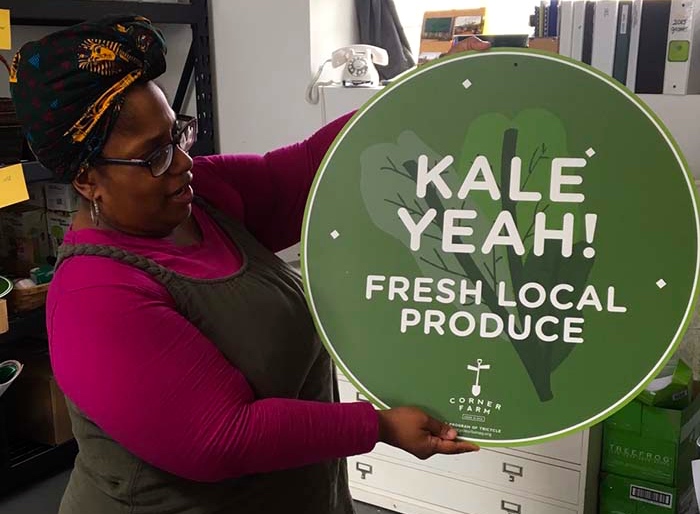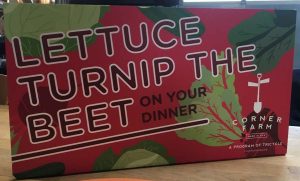by Kay Trulaske
A “food desert” is defined by the U.S. Department of Agriculture as an area “vapid of fresh fruit, vegetables, and other healthful whole foods, usually found in impoverished areas. This is largely due to a lack of grocery stores, farmers’ markets, and healthy food providers.”
That sounds very familiar to Sequoia Ross (above), program coordinator for Tricycle Gardens, a non-profit organization based in Church Hill. Downtown Richmond is one of the largest food deserts in the United States, she says. There are no large, well-stocked grocery stores in the area, and “corner grocery stores are chock-full of things that you can’t make a meal out of—chips, sugary drinks, that kind of thing.”
Tricycle Garden’s mission is to fill that desert with healthy alternatives, by growing and distributing organic produce to local stores and restaurants at affordable prices. Known as the Healthy Corner Store initiative, this program helps the community by providing and increasing access to affordable food that is healthy, fresh and locally grown (below).
Corner Store is how Sequoia, a classically trained chef, first heard about Tricycle. “We would whip up these recipes in the corner stores and I fell in love with the work that Tricycle was doing and the people,” she said. “They were true to their word that they really wanted to help the community—only good intentions.”
As a former chef, she loves Tricycle’s community tastings, which educate both shoppers and shopkeepers and help to create demand for healthier food.
“Our tasting team goes into the corner stores and offers samples of healthy food, prepared simply. You take some kale and make it into a savory muffin, and you realize that kale is not boring. Kale can be jazzed up, and you can incorporate it into a lot of different things. And that’s a great way for children to start eating kale.
“We also empower our store operators to take ownership, and say to their customers, ‘I’ve got collard greens over there, don’t you want to make some dinner?'” By keeping prices low, “we’re encouraging them to really sell the product.” Starting small, with a couple of food items in a few stores, the initiative has grown to weekly deliveries at 20 corner stores in downtown Richmond.
The success of this idea and others has inspired Tricycle Gardens to partner with other non-profits serving the community. One of these is the Peter Paul Development Center (PPDC), the oldest community-based agency in Richmond, which serves North Church Hill and East End neighborhoods with the highest concentration of poverty in the city.
PPDC provides children “a safe, consistent, structured, and loving environment in which to thrive, where staff and volunteers establish long-term relationships of trust and support for the children and their families.” To support this effort, Tricycle has developed the Children’s Garden, which teaches kids science and good nutrition, along with how to tend a garden and grow their own food.
Because of efforts like these, inner-city Richmond’s food desert is shrinking, one tomato at a time. And that makes Sequoia Ross very happy.
“I see every single day how we have been able to really touch people,” she said. “Food is what brings people together.”



